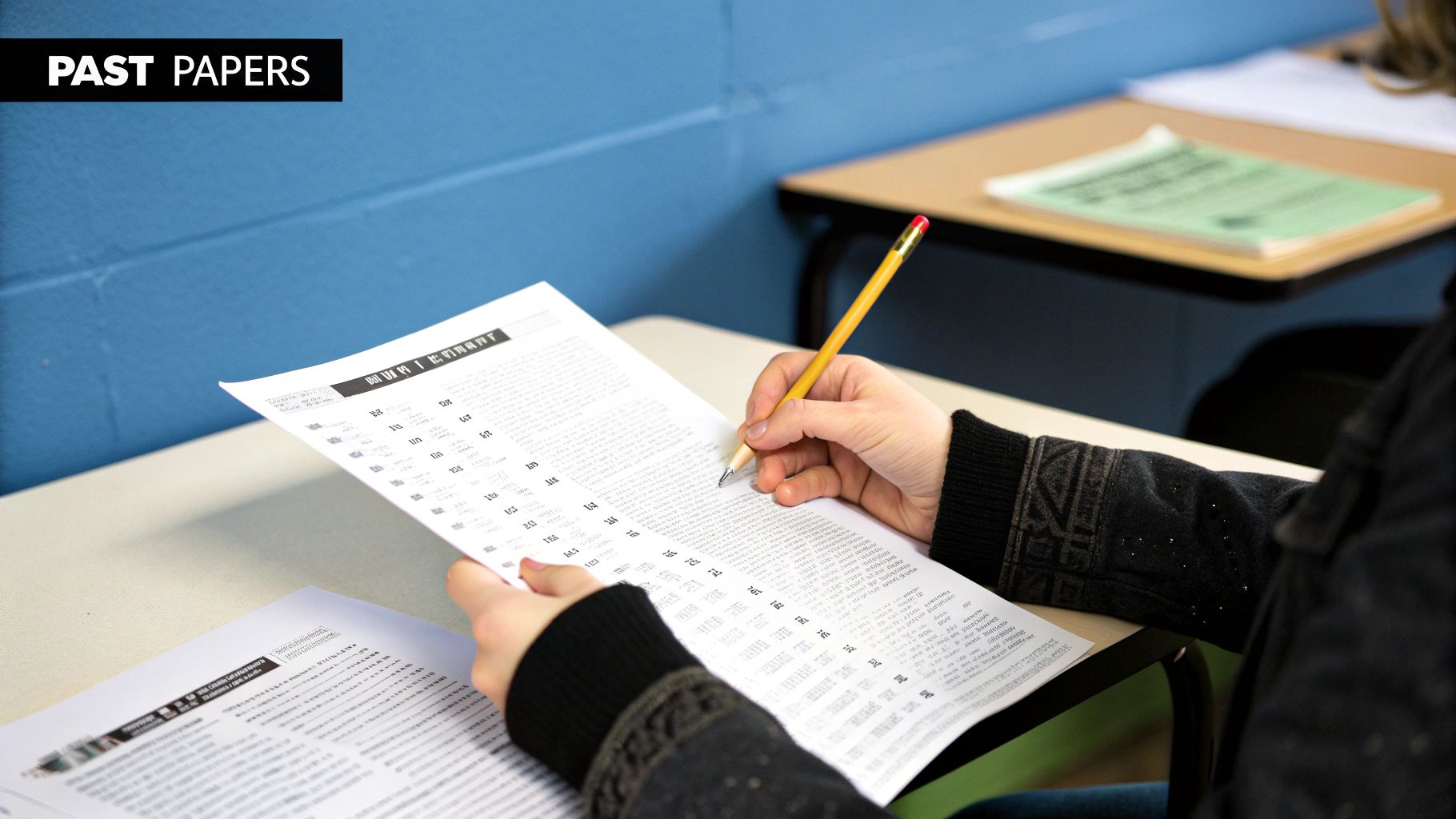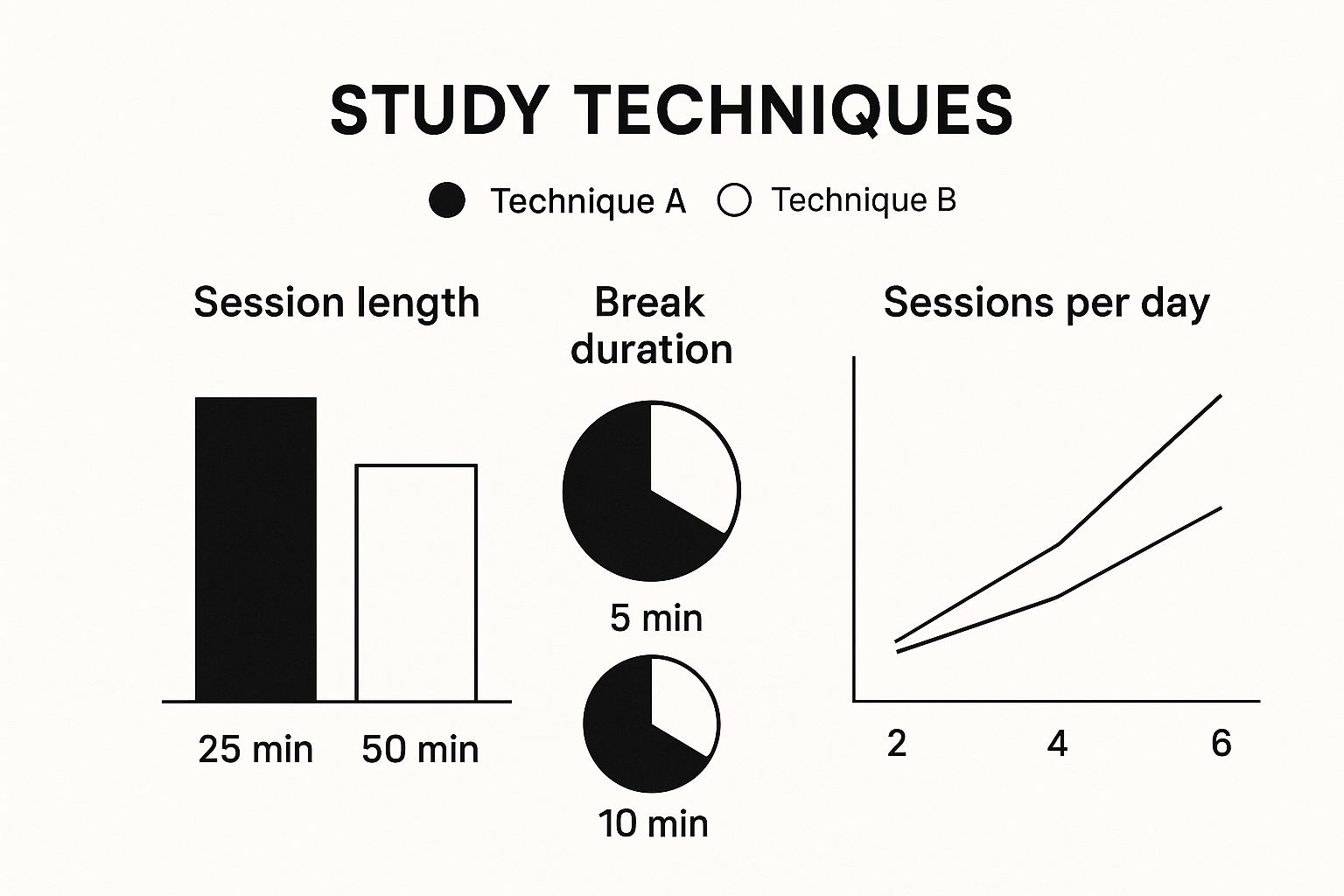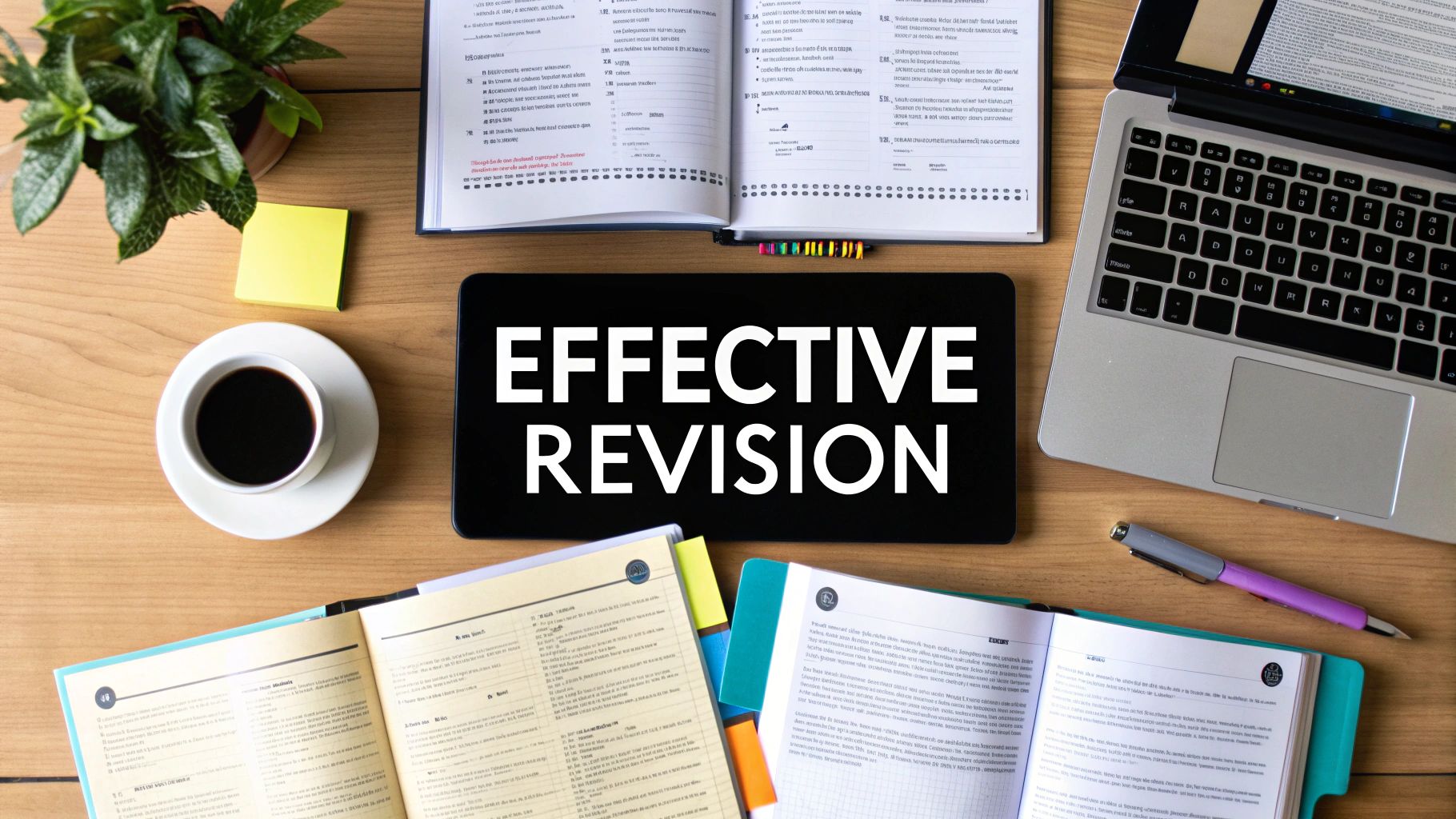Effective revision for a level is less about logging endless hours and more about creating a smart, sustainable strategy that actually protects your child's mental wellbeing. It comes down to building a solid plan, using active learning techniques, and knowing when to rest, so they can walk into that exam hall feeling prepared and genuinely confident.
Feeling Buried in Textbooks? Your Child's Not Alone

The A-Level revision journey can feel incredibly isolating. If your child is staring at a mountain of textbooks, feeling the pressure mount, and wondering where on earth to begin, know this: thousands of students are in the exact same boat right now. That feeling of being completely overwhelmed isn't something to ignore; it’s a signal. It’s their brain saying it's time to pause, take a breath, and channel that nervous energy into a calm, focused plan. This isn't about working harder; it’s about working smarter.
Turning Anxiety into Action
The goal here is to help your child build a revision strategy that works for them, not against them. Forget all those horror stories of all-nighters and last-minute cramming sessions. Real, sustainable success is built on three core pillars that put their needs first:
- Structured Planning: Crafting a realistic timetable that actually fits around their life, not the other way around.
- Active Learning: Using methods that force their brain to engage with the material, not just passively skim it.
- Protecting Their Wellbeing: Realising that rest, sleep, and good mental health are crucial parts of effective revision.
Think of this guide as a roadmap for both of you. It’s designed not just to help them pass their exams, but to get them to the exam hall feeling prepared, confident, and in control.
"Your child's brain isn't a computer; it needs rest, fuel, and care to perform at its best. Looking after themselves isn't a break from revision; it's an essential part of it."
The stakes can feel incredibly high, and it’s only natural for your child to feel the pressure to get the best grades they can. Recent data shows just what a significant accomplishment top marks are, with 9.4% of UK A-Level students earning an A* in 2024, a slight increase on the previous year. The most common grade awarded was a B, which highlights just how competitive these exams are.
Embracing a Smarter Approach
It’s easy for a student to feel like they’re drowning in information, especially with dense subjects. If you see your child consistently buried in textbooks, it might be worth exploring some powerful AI tools for students to study smarter to help them get a handle on the workload.
Ultimately, effective revision is all about building confidence. Every small step—planning one topic, mastering one tricky concept, finishing one past paper—is a victory. Let's start building that momentum together.
How to Build a Revision Timetable That Actually Works for Your Child

Let's be honest, those rigid, colour-coded planners you find online are mostly useless. A truly effective revision timetable isn’t something you download; it’s something you and your child build around their unique life, factoring in their energy levels, other commitments, and—most importantly—their need for rest.
The whole point is to create a tool that serves them, preventing burnout rather than causing it. A schedule packed with back-to-back study sessions is a fast track to stress and exhaustion. A smart timetable, on the other hand, brings structure and calm, giving them permission to focus and, just as crucially, permission to switch off without guilt.
Get to Know Their Personal Rhythm
The first step in any meaningful revision for a level plan is a bit of self-reflection. When is your child genuinely at their best? Fighting their natural body clock is like swimming against the tide—they’ll just get tired, fast.
Are they a morning person, sharp and ready to tackle complex problems before lunch? Or does their brain properly kick into gear after dinner, making evenings their prime time for deep focus? There’s no right or wrong answer, only what’s right for them. Encourage them to take a few days to just notice when they feel most alert and when their energy starts to dip.
This isn't about trying to fit your child into some idealised student mould. It’s about being brutally honest with themselves. If they know they're useless after 9 pm, scheduling a heavy topic for then is just setting them up for failure and frustration.
Once they've identified their peak windows, help them guard them. These are their 'golden hours' for the subjects they find the most difficult. For many students, the core principles of revision are similar to what they did for GCSEs, but the stakes and complexity are much higher. You can find some great advice on building solid study habits in our guide on how to revise for GCSEs, which can easily be adapted for A-Level intensity.
Prioritise with Purpose, Not Panic
With their energy patterns mapped out, it's time to decide what to study and when. Don't just list subjects and fill in the blanks at random. A strategic approach comes down to two key things:
- Their Confidence Levels: Encourage them to be completely honest here. Which topics make their stomach drop? Which ones feel like old news? They should start by giving more time to their weakest areas, as these are the ones that need the most work to improve.
- How Soon the Exam Is: Get the exam schedule out. The subjects with exams coming up sooner should naturally move to the top of the list. Creating a simple countdown for each paper can help keep this front and centre in their mind.
This mix of self-assessment and practical deadlines ensures they're not just busy, but actually productive. They’ll be directing their best energy towards the areas that will make the biggest difference to their final grades.
Use Block Scheduling for a Better Balance
Now, let's put it all together using a technique called block scheduling. This method ditches the punishing hour-by-hour schedule in favour of creating flexible blocks of time for different activities—and that includes life outside of revision.
This simple table shows how a student could structure a week, balancing three subjects with essential breaks.
Example Weekly Revision Block Schedule
| Time Slot | Monday | Tuesday | Wednesday | Thursday | Friday |
|---|---|---|---|---|---|
| 4:30 – 6:00 PM | Biology (Hard Topic) | English (Essay Plan) | Biology (Practice Qs) | History (Source Work) | English (Lit Crit) |
| 6:00 – 7:00 PM | BREAK | BREAK | BREAK | BREAK | BREAK |
| 7:00 – 8:15 PM | History (Review) | Biology (Review) | History (Essay Plan) | English (Practice Qs) | Free / Catch-up |
| 8:15 PM onwards | Wind-Down Time | Wind-Down Time | Wind-Down Time | Wind-Down Time | Weekend Starts |
Let's look at how this might play out for your child. Imagine a student, Alex, is juggling Biology, English Literature, and History. Biology is their toughest subject, and that exam is first. Here’s how Alex could structure their weekday evening:
- 4:00 PM – 4:30 PM: Decompress Block (Go for a walk, grab a snack, listen to music—no screens! This is vital for switching from 'school mode' to 'study mode'.)
- 4:30 PM – 6:00 PM: Focused Revision Block 1 (Biology: tackle a tough topic like gene expression while energy is still high.)
- 6:00 PM – 7:00 PM: Dinner & Social Block (A proper break to eat and chat with family. Connection is a powerful antidote to stress.)
- 7:00 PM – 8:15 PM: Focused Revision Block 2 (History: review sources for an upcoming essay, a slightly less demanding task.)
- 8:15 PM onwards: Complete Wind-Down (Hobbies, friends, reading—absolutely no revision allowed. This is crucial for sleep and mental health.)
See how the breaks are scheduled with the same importance as the study blocks? This structure fights decision fatigue and makes it clear that switching off is a non-negotiable part of the plan. A happy, rested child is a more effective learner.
Think of their timetable as a guide, not a jailer. If a session just isn't working, it’s fine to swap blocks around. The goal is consistency, not perfection.
Active Revision Techniques That Cement Knowledge

We’ve all seen it. A child spends hours poring over class notes, their textbook glowing with a rainbow of highlighter ink. It feels productive, but when they try to recall that same information a day later… nothing. It’s gone. It's a frustrating experience that can make them feel like a failure.
This is a classic revision trap. Passive reviewing—just reading or highlighting—is one of the least effective ways to learn. Their brain doesn't have to work hard to recognise something it's already seen. Real learning, the kind that gets top marks in a tough exam, happens when you force the brain to actively pull information out of storage.
This is called active recall, and it’s the cornerstone of any effective revision for a level strategy. It’s the difference between being a spectator and being a participant in their own learning. By constantly testing themselves, they’re not just checking what they know; they’re building stronger, faster pathways to that knowledge.
Master a Topic by Teaching It to Someone Else
One of the most powerful active recall methods is the Feynman Technique. The concept is deceptively simple: your child takes a complex topic and explains it to you or a friend in plain English, as if they were teaching a ten-year-old.
Let's say your child is an A-Level Economics student trying to explain 'monetary policy'. They can't just throw around jargon like "quantitative easing" or "base rate." They would have to break it down for you.
- They could start by saying: "Think of the Bank of England as the manager of the UK's money. When the economy is slow, they want people to spend more, so they make it cheaper for us to borrow."
- Then, explain the 'how': "They do this by lowering the 'base rate,' which is the special interest rate they charge to high-street banks. If it's cheaper for those banks to borrow, it becomes cheaper for us to get loans for cars or houses."
- Finally, connect the dots: "This encourages spending, which helps businesses grow and creates jobs. But if they make it too cheap for too long, prices can go up too quickly, which is called inflation."
The moment they stumble or have to say "it's just complicated," they've found a gap in their own understanding. That's their cue to go back to their notes and fill in that specific piece of the puzzle. This process is far more engaging and less isolating than studying alone.
Make Flashcards That Actually Work
Flashcards are a revision staple, but most students use them passively. Simply writing a key term on one side and a long, copied-out definition on the other just turns them into a mini-reading exercise. The key is to make them trigger a thought process.
For a subject like Sociology, instead of a card that says "Durkheim" on one side and his entire theory of suicide on the back, encourage them to frame it as a question:
- Front of Card: "What were the four types of suicide Durkheim identified, and what societal conditions did he link to each one?"
- Back of Card:
- Egoistic: Low social integration (loner)
- Altruistic: High social integration (cult member)
- Anomic: Low social regulation (after a stock market crash)
- Fatalistic: High social regulation (prisoner)
This format forces them to actively retrieve and connect multiple ideas—exactly what they’ll be doing in an exam. They're practising the skill of recall, not just recognition.
Use Blurting to Expose Knowledge Gaps
Blurting, sometimes called a 'brain dump', is a brilliantly effective technique. All your child needs is a blank piece of paper and a timer. They pick a topic, set the timer for 10-15 minutes, and write down absolutely everything they can remember about it.
Don’t worry about structure, grammar, or making it neat. The goal is simply to get it all out of their head and onto the page. It can be a huge release of mental pressure.
Once the timer goes off, stop. They grab their textbook or notes and a different coloured pen. Now, they go through what they’ve written. Correct any mistakes, add missed details, and fill in the blanks. The areas filled with the new colour are their weak spots—the perfect focus for their next revision session.
This method provides an honest, visual snapshot of what's truly stuck in their long-term memory versus what they only vaguely understand. It’s a quick and powerful diagnostic tool that turns a feeling of 'not knowing enough' into a clear action plan.
These techniques are demanding. They take more mental energy than passive reading, but the payoff is huge. Every student deserves the chance to reach their full potential, and active revision is a key part of that journey. It's also important to acknowledge that for some, the path is harder. For example, in 2022/23, 93.7% of non-disadvantaged A-Level students completed their study programmes, compared to only 86.8% of disadvantaged students. You can explore more about these educational trends in a detailed report on A-Level results across the UK. Shifting to active revision strategies is a concrete step your child can take to make their study time count, strengthening their knowledge and building the confidence they need to succeed.
Tailoring Their Strategy for Different Subjects
Trying to revise for A-Level Maths the same way you revise for English Literature is a classic mistake. It’s like trying to use a hammer to bake a cake; you’re busy, sure, but you’re using the wrong tool and just getting frustrated. Applying a blanket strategy to every subject is one of the biggest drains on a student's time and energy.
The real breakthrough comes when they stop and think about what each exam is actually asking of them. What skills are being tested? Is it their ability to build a sustained argument, solve a complex multi-step problem, or recall specific knowledge under pressure? The needs of each subject are unique, and their revision must be, too.
Cracking the Code for Essay-Based Subjects
For subjects like History, Politics, or English, the exam isn't just a memory test. It’s a test of critical thinking and the ability to build a persuasive argument. Simply knowing the facts isn’t enough—they have to use them as evidence to back up their point of view.
This means their revision should centre on planning and practice. Instead of just re-reading notes on the Russian Revolution, their time is far better spent breaking down past paper questions.
- Deconstruct the Question: Help them take a 25-mark essay question and pull it apart. What's the core debate? What key terms need defining? What different perspectives could they take?
- Plan the Argument: Before writing a single word, they should create a spider diagram or a bullet-pointed plan. This involves figuring out their three main points, the evidence they'll use for each, and how they’ll link them together to create a flowing argument. For example, for a question on the causes of the Cold War, one point might be 'Ideological Differences,' with evidence like Churchill's 'Iron Curtain' speech.
- Practise Under Pressure: Timed essays are their best friend here. Even if they only write one paragraph in 20 minutes, they’re training their brain to retrieve information and structure it quickly, reducing panic on exam day.
The goal is for your child to walk into the exam hall with a mental toolkit of arguments and evidence, not just a head full of isolated facts. You want them to feel able to adapt and build, not just recite.
Mastering the Logic of Sciences and Maths
When it comes to STEM subjects like Physics, Chemistry, and Maths, the focus shifts dramatically from interpretation to application and problem-solving. While knowing the formulae is essential, the real challenge lies in knowing when and how to apply them.
Relentless practice is the name of the game. Success in these subjects is built on repetition and methodically working through problems until the processes become second nature. Their revision should be almost entirely active.
Let's take a multi-step physics problem on projectile motion. It requires a totally different approach from an essay:
- Identify the Knowns: What information has the question given? (e.g., initial velocity = 20 m/s, angle of projection = 30°).
- Identify the Unknown: What is the question actually asking for? (e.g., find the maximum height).
- Select the Right Tools: Which equations of motion are relevant to this specific problem? (e.g., v² = u² + 2as).
- Execute Step-by-Step: Solve each part of the problem methodically, showing the working clearly. This builds confidence and makes it easier to spot errors.
This kind of focused, active work is where different time management techniques really shine.

As the infographic shows, your child might find that shorter, intense bursts are perfect for grinding through problem sets, whereas longer, uninterrupted blocks are better for planning out a detailed essay. There’s no single best way; it’s about matching the technique to the task at hand and what feels right for them.
Revision Strategy Comparison by Subject Type
To make it even clearer, understanding how to adapt methods is crucial. The table below breaks down the most effective techniques for different categories of A-Level subjects, helping your child tailor their approach.
| Subject Type | Primary Focus | Most Effective Techniques | Common Pitfalls to Avoid |
|---|---|---|---|
| Essay Subjects (e.g., History, English) | Argument & Analysis | Timed Essays, Reverse Outlining, Creating Mind Maps | Memorising facts without understanding their context or significance. |
| STEM Subjects (e.g., Maths, Physics) | Problem-Solving | Past Paper Drills, The Feynman Technique, Topic-Specific Question Banks | Only reading worked examples without attempting the problems themselves first. |
| Content-Heavy (e.g., Biology, Psychology) | Knowledge Recall | Blurting, Spaced Repetition (Flashcards), Creating Summary Sheets | Passively re-reading notes and textbooks without active recall. |
Ultimately, choosing the right strategy for the right subject is what makes the difference. It stops revision from feeling like an overwhelming, vague task and turns it into a series of clear, manageable actions.
This tailored approach transforms their revision for a level by putting their needs at the centre. It allows them to direct their precious energy where it will have the biggest impact, building both their skills and their confidence for exam day. Whether they're studying at home or in a traditional school, finding the right strategy is key to unlocking your A-Levels success online.
Protecting Your Child's Mental Health During Exam Season
Let's get one thing straight: your child's brain isn't a computer. You can't run it at full capacity, 24/7, and expect no consequences. Pushing through exhaustion and ignoring stress isn't a sign of dedication—it's a fast track to burnout, which can derail even the most organised revision for a level plan.
Placing their wellbeing at the centre of their study strategy isn't just a nice idea; it's a non-negotiable part of achieving their best. A rested, calm, and healthy student will always absorb information more effectively and perform better under pressure than someone running on empty.
Fuel Their Brain and Body
What your child eats and how much they sleep aren't luxuries during exam season; they are fundamental tools for academic success. Sleep is when their brain does its most important work, consolidating everything they've learned during the day into their long-term memory. Skimping on sleep to cram more information in is completely counterproductive, as they're far less likely to retain any of it.
Proper nutrition and hydration are just as vital. Keep a water bottle on their desk and have healthy snacks on hand to prevent those energy crashes that kill their focus.
- Hydration: Even mild dehydration can seriously impair cognitive function and concentration.
- Nutrition: Go for brain-boosting foods like nuts, berries, and leafy greens over sugary snacks that lead to an inevitable slump. A banana and a handful of almonds are a great pre-study snack.
Physical comfort matters, too. If they're going to be sat at a desk for hours, ensuring they have a proper ergonomic setup is crucial for their wellbeing and focus. It’s worth looking into selecting the best ergonomic office chair to reduce physical strain.
Manage Stress in the Moment
Exam season brings a huge amount of pressure. That ambition to do well is a powerful motivator, but it can quickly morph into anxiety if it isn't kept in check. Competition for top marks is fierce, with the proportion of A* and A grades reaching 28.2% in 2025—a noticeable increase from 25.2% pre-pandemic in 2019. This rising standard makes it even more important to manage their stress so they can perform at their peak.
When you see that sense of panic setting in, simple breathing exercises can make a world of difference. Encourage them to try the 4-7-8 technique: breathe in for four seconds, hold for seven, and then exhale slowly for eight. Doing this just a few times at their desk can calm their nervous system right down and bring them back to the present moment.
Step Away to Stay Focused
Scheduling breaks is just as important as scheduling study time. Your child's brain genuinely needs downtime to process information and reset itself. A short walk outside, listening to a few songs, or just stepping away from their screen can work wonders for their focus. For example, suggesting a 15-minute walk around the block together can be a great way to connect and get some fresh air.
This is especially true for managing digital fatigue. Staring at a screen for hours on end strains the eyes and mind. Stepping away from devices, even for just ten minutes, can massively improve focus when they return. Parents can find more advice on this in your guide to online A-Levels UK for parents.
Remember, taking care of themselves isn't a break from revision; it's an essential part of it.
Common Questions About A Level Revision
As your child gets deeper into their A Level revision, it’s completely normal for a few anxieties to creep in. Am I doing enough? Am I even doing this right? How do I keep going when I just want to stop?
They're not alone. Every student asks these questions. Let's tackle some of the most common worries with practical, realistic advice. The goal isn't for them to follow some perfect, rigid formula, but to find a rhythm that actually works for them. Their friend might thrive on twelve-hour study marathons, but that doesn’t mean they have to. Putting their own needs at the centre of their planning is the key to sustainable success.
How Many Hours a Day Should My Child Revise?
This is the big one, isn't it? And the answer is refreshingly simple: focus on quality over quantity. A student's brain can only handle so much focused work in a day before it hits a wall.
Four hours of truly focused, active revision—where they're actually testing themselves, solving problems, and engaging with the material—is far more valuable than eight hours of distracted, passive reading. Let's be honest, staring at a textbook while their phone buzzes next to them doesn't really count.
Think of it like this: a short, high-intensity workout is often more effective than a long, meandering walk. The same principle applies to the brain. Encourage them to schedule shorter, focused blocks of around 45-50 minutes, take a proper break away from their desk, and then go again. This is how they can make their study time count without burning out.
What’s the Best Way to Use Past Papers?
So many students save past papers for the frantic final weeks before an exam, treating them like a final dress rehearsal. This is a huge missed opportunity. Past papers are one of the most powerful tools in your child's revision for a level arsenal, and they should start using them much, much earlier.
Don't just let them complete them for the sake of it; use them as a diagnostic tool right from the start.
- Understand the Mark Scheme: This is a secret weapon. The mark scheme shows exactly what examiners are looking for. They'll quickly realise that certain keywords or specific steps are non-negotiable for getting full marks.
- Spot Recurring Question Types: Examiners have their favourite styles of questions. By doing past papers early, students start to recognise these patterns and can build a mental bank of strategies for tackling them. For instance, in A-Level History, they'll always find a source analysis question, so they can practice that specific skill.
- Get Comfortable with Timed Conditions: The pressure of the clock is a real factor on exam day. Practising under timed conditions from the get-go helps build speed and confidence, reducing panic when it matters.
Encourage them to use their first few past papers to identify weak spots. If they consistently drop marks on a certain type of question, that’s a clear signal to go back and revisit that topic using active recall methods.
How Do I Help Them Stay Motivated When They Want to Quit?
Motivation isn't a constant. It’s a wave that comes and goes. The trick isn't to feel motivated all the time—because nobody does—but to have systems in place for when their motivation inevitably dips.
That overwhelming feeling usually hits when they’re looking at the entire mountain, not just the next step in front of them.
The solution? Help them break things down into laughably small, manageable tasks. Instead of a goal like 'revise all of macroeconomics,' set a tiny goal: 'master one formula today' or 'plan one essay paragraph.' Completing that small task gives them a little win, a shot of dopamine that makes it easier to tackle the next one.
When they really feel like quitting, take a moment to reconnect with their long-term goals. Why are they doing this? What university course are they aiming for? What future does this open up for them? Gently remind them of the bigger picture.
And remember, it’s completely okay for them to have an off day. Everyone does. The most important thing is to show them some compassion, let them rest, and help them get back on track the next day without the guilt. Consistency beats intensity every single time.
At Queens Online School, we understand that a successful education is built on personalised support and a deep commitment to student wellbeing. We provide a structured yet flexible online learning environment where students receive live, interactive lessons from subject-specialist teachers, ensuring they have the guidance they need to excel in their A-Levels and beyond. Explore how our online school can support your child's journey to success.

